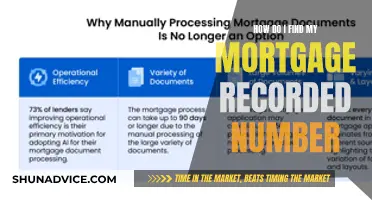
If you're looking to find out more about a property's mortgage details, there are several ways to go about it. You can start by checking real estate websites, which often display basic information about a property, such as its assessed value and sales/listing history. You can also contact a real estate agent to help you gain access to the property owner's contact information. If you already know the property's address, you can conduct a public records search, which will give you information on the borrower's name, property address, and amount owed. This information is considered public record and can be found through various online tools and government offices. Additionally, you can request information from the title company or conduct a lien search to uncover any judgments or liens against the property.
| Characteristics | Values |
|---|---|
| Search parameters | Property address, owner's name, or property ID number |
| Sources | Real estate websites, county clerk's office, listing agent, lien search, title company, public records, mortgage servicer |
| Information obtained | Mortgage records, assessed value, sales/listing history, photos, title defects, liens, property tax records, amount owed, fair market value |
| Additional considerations | Consult a professional or real estate agent, conduct a title search, purchase title insurance |
What You'll Learn

Search public records
Public records are a great way to find out information about a property's history before making an offer. While the specific departments you'll need to contact will differ depending on the state, county clerk offices, offices of public records, and public recorders' offices are all good places to start.
In most cases, you'll need to know the name of the current homeowner, the full street address of the property, and the state and county in which the property is located. With this information, you can contact the appropriate recorder's office, either in person or through their official website, and request to access the relevant mortgage documents. These documents will often include the property's legal description, address, lender, mortgage amount, and other pertinent information.
It's important to note that while accessing public records is typically free, many agencies will charge a fee for printing copies of the documents. Additionally, each state has different laws, known as "recording statutes," regarding home deeds and mortgage documents. These laws dictate the specific requirements for recording real property in a county office, and you should ensure that you're familiar with the relevant statutes in your state.
Public mortgage records can be a valuable tool for potential homebuyers, as they can provide insight into the current owners' motivation to sell, the current value of the property, and how much you should offer. They can also help you identify any liens or judgments against the property, which could impact your decision to purchase.
Finding Your Wells Fargo Mortgage Balance: A Guide
You may want to see also

Contact the listing agent
If you are looking to find out mortgage information about a property, one of the best steps you can take is to contact the listing agent. They will be able to provide you with the address of the property, which is often all you need to then conduct your own public records search.
Real estate agents have access to multiple listing services (MLS) and can provide valuable insights into a property's financial history. They can access the MLS database and look for any records of previous sales, liens, or mortgages associated with the property. They are experienced in property research and can offer guidance throughout the buying process. If you are a first-time buyer or new to the local market, a real estate agent can be a huge help. They can review the numbers with you and help you produce a fair offer to present to the property owners.
If you are unsure of which county the property is in, you can ask the listing agent for this information. They will also be able to tell you the name of the mortgage holder, which you can then use to conduct further research.
If you are interested in a property, it is crucial to determine if it has an existing mortgage. This will involve researching public records, consulting professionals, and conducting an online search. You can also request a property report, which will give you comprehensive information about a property's history, ownership, and mortgage details.
Finding an Old Mortgage Account: Tips and Tricks
You may want to see also

Consult a real estate agent
If you're looking to find out information about a homeowner's mortgage, consulting a real estate agent is a great option. Real estate agents are well-versed in property transactions and have access to multiple resources to determine a property's mortgage status. They can help you navigate the process and provide valuable insights based on their experience. Here are some reasons why consulting a real estate agent can be beneficial:
Expertise and Experience:
Real estate agents have a deep understanding of the industry and the local market. They know what to look for and can help you interpret the mortgage information you find. Their expertise can be especially valuable if you're considering buying or selling a property. They can guide you through the entire process, ensuring you make informed decisions.
Access to Multiple Listing Services (MLS):
Real estate agents have access to MLS databases, which contain a wealth of information on properties. They can look up the property's history, including any records of previous sales, liens, or mortgages. This information can be crucial in understanding the financial status and value of the property.
Assistance in Gathering Information:
If you don't have the property address or the owner's name, a real estate agent can assist you in obtaining this information. They can work with you to gain the necessary contact details and guide you through the process of acquiring relevant data. This is especially useful if you're just starting your search and need help accessing basic property details.
Insight into Property History:
Real estate agents can offer insights beyond just the mortgage information. They may be able to provide you with additional details about the property and its history. If the property is currently listed for sale, they can contact the listing agent and gather more information on your behalf. Their connections and knowledge of the market can be advantageous in getting a comprehensive understanding of the property.
Negotiation and Offer Guidance:
Once you have the mortgage information, a real estate agent can help you review the numbers. They can assist you in producing a fair offer to present to the property owners. Their experience in negotiations and understanding of market values can strengthen your position during the negotiation process.
Remember, while consulting a real estate agent can be incredibly beneficial, it's always a good idea to cross-reference the information they provide with other available resources, such as public records or title companies. This ensures that you have a comprehensive understanding of the property's mortgage status and can make well-informed decisions.
Finding Assumable Mortgages: Strategies for Success
You may want to see also

Request a title search
A title search is a crucial step in the home-buying process. It involves examining public records to determine and confirm a property's legal ownership. Title searches are typically conducted by title companies or attorneys, but individuals can also perform them. However, it is not recommended as legal documents can be confusing and accessing courthouse records can be challenging.
To request a title search, you can follow these steps:
- Obtain Basic Information: Before initiating a title search, gather essential details about the property. This includes the property's address, which is usually available on real estate listings. If you don't have the address, you can search using the owner's name or contact a real estate agent for assistance in obtaining the necessary information.
- Identify Relevant Sources: Title searches involve gathering information from multiple sources, including deeds, tax liens, land records, and court judgments. Identify the specific sources you need to access based on the property's location and any unique circumstances.
- Engage Professionals: While you can conduct a title search on your own, it is advisable to seek professional assistance from a real estate attorney or a title company. They have expertise in navigating legal documents and accessing public records, ensuring a thorough and accurate search.
- Understand the Process: A title search typically involves the following steps:
- Research: The title company or attorney will research public records and legal documents to establish a chain of title and confirm the seller's rightful ownership. They will look for any liens, judgments, loans, or property taxes associated with the property.
- Abstract of Title: The title abstractor, a professional who conducts the search, will prepare an abstract of title. This document includes a chronological summary of all relevant documents and transactions related to the property.
- Clean or Dirty Title: Based on the findings, the title search will result in either a clean or dirty title. A clean title indicates clear and free ownership, with no contested claims. A dirty title arises from issues such as filing problems, unresolved violations, or outstanding claims.
- Resolve Issues: If the title search uncovers any problems, you can take appropriate steps. For example, you can attempt to resolve issues with the seller or consider purchasing title insurance to protect your ownership claim. Title insurance provides financial protection against claims related to liens, encumbrances, or defects in the title.
- Receive Preliminary Title Report: Once the title search is completed, you will receive a preliminary title report outlining any issues or problems discovered. This report will help you make an informed decision about proceeding with the purchase or addressing any concerns.
Remember, a title search is a critical measure to protect your investment and ensure that there are no contested claims on the property's ownership. While it may take about two weeks to complete, it is a worthwhile step to provide peace of mind and mitigate potential risks.
Finding Proof of Paid-Off Mortgages
You may want to see also

Review the numbers
Once you have assembled the basic information about a property, you can start to review the numbers. Mortgage records are public information, and they can provide important insights about the current owners and their willingness to sell. These records can show how much the owner borrowed, how frequently the property has been listed for sale, and when the lender transferred the mortgage to another company.
Public records can be accessed through the county clerk and public records offices, as well as online resources such as real estate websites. In Georgia, for example, the Department of Revenue provides links to each county's board of assessor's office, where you can search for mortgage information using the property address, property ID number, or owner's name. Many counties also offer free basic access to public records, with a premium option for more detailed information.
If you are unsure about reviewing the numbers yourself, it is recommended to consult with a professional. A real estate agent who knows the market can help review the numbers and produce a fair offer for the property. They can also provide additional insights into the property and its history, including any previous sales, listings, and prices.
Additionally, if you are looking to find out who owns your mortgage, you can send a written request to your mortgage servicer. They are obligated to provide you with the name, address, and telephone number of the owner of your loan. Online tools are also available to look up this information, and many mortgages are owned by Fannie Mae and Freddie Mac, which offer mortgage lookup tools on their websites.
Frequently asked questions
You can look up who owns your mortgage online, call, or send a written request to your servicer asking who owns your mortgage. You can also request this information from a title company, which can also reveal whether there are any judgments or liens against the property.
You will need to obtain some basic information about the property, such as the property address, owner's name, or property ID number.
You can find mortgage information on real estate websites, which often display basic information about a property, such as its assessed value and sales/listing history. You can also find mortgage records at the county clerk's office or on the county's board of assessor's office website.







